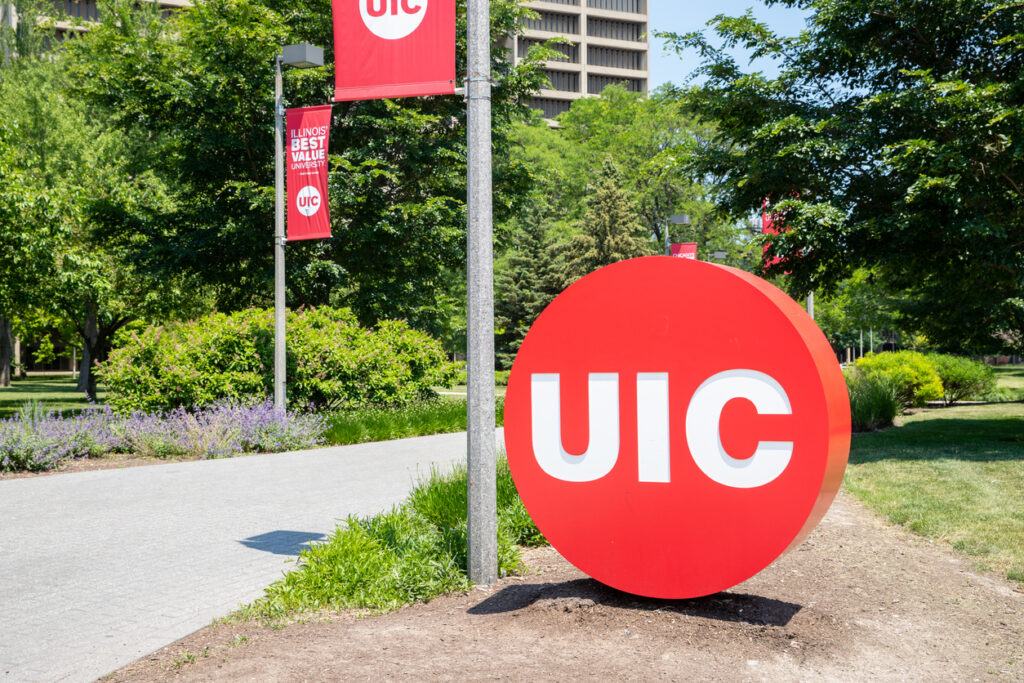How university communicators are preparing for a heated election season
Lessons from the University of Illinois Chicago’s Student Affairs department in training, expression and beyond

There is hardly a university in the world that hasn’t hosted political activity on campus. They’re critical sites for getting young voters registered, encouraging civic participation and giving students a voice in political discourse.
However, even the highest-ranking schools have stumbled in recent years when navigating contentious, politicized topics and student activity around them. Notably, Harvard struggled to time and align its messaging around the outbreak of the ongoing Israel-Hamas crisis last year.
The University of Illinois Chicago (UIC) has this dynamic well in hand: Year after year it has been dubbed a “Voter-Friendly Campus” by the Fair Elections Center’s Campus Vote Project and the national association for Student Affairs Administrators in Higher Education (which goes by the legacy acronym NASPA).
The school does so in large part thanks to the work of its Student Affairs department.
But it’s going to be a big year — and especially for UIC, because the 2024 Democratic National Convention will be held just three miles from its campus in August.
Joy Vergara, assistant vice chancellor for student engagement at the university, spoke to Ragan about how her teams and other departments are preparing for the coming election season. She discussed the importance of ethics and compliance guidelines, annual training and efforts to ensure inclusive expression on campus.
Open expression comes first
UIC’s Student Affairs department prioritizes and encourages open expression on campus, including politically oriented events organized by students, faculty and departments.
Its open expression policy emphasizes the importance of facilitating “the free exchange of ideas and the expression of dissent within the university community,” UIC states, provided any demonstrations are done “in a peaceful and non-disruptive manner.”
Empowering the community to engage in these events using university facilities and spaces requires a constant commitment to preparedness, including communicating and implementing safety measures to ensure events do not get out of hand.
“A lot has changed since the last election,” Vergara said. “We are anticipating that there will be more open expression, so we are having more discussion around staffing. We want our students to debate the topics, and we want our students to bring in different speakers. We just want to make sure safety measures are in place so our students can have these different discussions, whether it is left, right, in the middle or independent.”
Open expression and academic freedom policies are distributed and reinforced each semester through the Dean of Students Office.
Student Affairs plays a lead role in creating safe environments for peaceful demonstrations and political events, collaborating with event organizers, demonstrators, faculty or staff sponsors, campus police, and the Public Affairs, Emergency Operations and Dean of Students Administration departments. According to the university’s grid of open expressions policies, procedures and responsibilities for open expression, these parties:
- Annually create and review guidelines and “Incident Action Plans” around demonstrations and political events.
- Outline and document plans and participants in each event to ensure campus safety officials are informed and prepared.
- Monitor events and demonstrations to ensure they adhere to guidelines and do not become disruptive, and activate security and safety protocols, as well as disciplinary action if necessary.
- Monitor social media and news coverage around the events and prepare official statements and responses as needed, as well as respond to media requests for comments and information.
- Maintain open communication with the organizers and demonstrators before, during and after the event.
- Conduct an “After-Action Report,” which is “a detailed critical summary of a recent incident made for the purposes of reassessing decisions and considering possible alternatives for future reference.”
- And far more besides.
Training is critical
All of the above requires a highly trained staff who is well-versed in protocol, communication and ethics every step of the way.
Vergara said that annual ethics training is mandatory for faculty and staff. As someone who has worked at the university for 10 years, she’s done 10 separate ethics training sessions, all of which covered communications around political activity and events. These trainings, which are conducted online with reporting mechanisms to ensure accountability, are guided by on-campus ethics and compliance officers.
Ethics often come into play when external speakers and participants — say, a political activist or candidate — are invited to participate in on-campus political events, and when external organizations rent space for political activities.
“We always want to make sure that the student organizations know what they’re allowed to host on campus, who they can bring to campus,” said Vergara. “There might be stakeholders that disagree with whoever they bring in on campus. And so the student organizations and leaders provide some guidance. We have to carefully navigate what we help our students host versus what the university is allowed to host or not.”
These situations can present fine lines between what is allowed and what isn’t, so it’s important to clearly define what political activities are prohibited. “When the staff is well versed in that, we can ultimately prepare for what the students may want to do and how people may react,” Vergara said.
Student Affairs is also responsible for managing annual registrations of student organizations and communicating with students about what they are permitted to do on campus.
They also lean heavily on the expertise around departments focused on political science, race and beyond. Resources such as “Diversity Dialogue” courses and faculty research are also offered to help staff and students engage in productive conversations around difficult topics. “We can tap into some of this expertise if we’re not feeling confident enough to lead these facilitations,” said Vergara. “Faculty and staff can help you in the knowledge gap.”
Planning ahead
As this sure-to-be contentious election cycle heats up, Vergara and her department are focusing on consistent communications of those open expression policies each semester to ensure students, faculty and staff are able to engage while the other operations of the university continue.
The DNC in August will not only make the campus host to a range of political events and activity, it will also impact campus transportation and logistics. UIC will work with the city and the national conventions to keep the university’s day-to-day operations running smoothly and address any safety concerns as they arise.
Vergara stressed that communicating “time, place and manner” for open expression is critical.
“We need to allow coursework and academic work to proceed and make progress,” she said. “We need to make sure that the community understands when there’s a time and place and manner when open expression could occur.”
Joy Vergara will join Ragan at our 2024 Employee Communications and Culture Conference, April 16-18, in Chicago. Learn more and register.
Jess Zafarris is director of content at Ragan and PR Daily.






